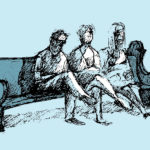We don’t have to look far to see an immense amount of hurt in our world. That is made plain to us—to the point of being unavoidable—everywhere we turn. What may not be as apparent: Each of us will play a part in that hurt. What part will we play?
The hurt takes every form imaginable—physical, mental, financial, spiritual—and is coming from every direction possible—nature great and small, the economy, politics, violence, to name just a few. This means healing and restoration takes every form imaginable in every place possible. What part will we play?
Natural disasters
During the recent Baptist General Convention of Texas Executive Board meeting, John Hall, director of communications for TBM, asked attendees to envision being on the roof of their house, looking out over their entire community and not seeing a single undamaged roof. Inside the house stands two feet of water. There’s no electricity, no clean water and few other necessities.
This is the case for thousands throughout Louisiana following Hurricane Ida. The hurt associated with it is multiform—physical, mental, financial and spiritual—and calls for a full-bodied response.
Baptist disaster relief crews have been on the ground in Louisiana for at least three weeks already and plan to be there for weeks to come. TBM intends to respond to the hurt with “help, hope and healing.” They are providing meals, clearing trees and communicating the gospel. But they can’t do it alone. To learn how to get involved, visit the TBM website.
Abortion
Also during the BGCT Executive Board meeting, staff of Texas Baptists’ Christian Life Commission praised passage of Senate Bill 8, the so-called “heartbeat bill,” which bans abortions in Texas after six weeks gestation. While glad for restrictions put on abortion and hopeful for a total ban, David Sanchez and Katie Frugé were quick to remind meeting attendees pro-life applies to all life, from “womb to the grave.”
Sanchez asked attendees to imagine the overwhelming fear a woman might have after learning she is pregnant, while being unprepared to carry the pregnancy, much less care for the child after it is born. Frugé noted the new law is not an end, but increases the opportunity—need—to care for women all the way through their pregnancies and beyond.
Abortion is a much edgier subject than disaster relief. We tend to line up on one side or the other of the edge and fight like hell, but do we ever live like heaven? Do we ever turn our swords into plowshares and make the kingdom of heaven present for those overwhelmed with the kind of fear, shame or doubt that often accompanies unplanned or unwanted pregnancies?
There is multiform hurt around the issue of abortion—physical, mental, financial and spiritual. Laws banning abortion don’t have the power to address all of that. But Christians do. What part will we play?
Sign up for our weekly edition and get all our headlines in your inbox on Thursdays
Sexual abuse
Yet a third source of hurt featured prominently in the recent BGCT Executive Board meeting—on the same day it embroiled the SBC Executive Committee. Sexual abuse perpetrated by clergy and other church leaders is a deep and multiform hurt. Its survivors among Baptists hope the church and its conventions will take up the role of healer and restorer, rather than enabler.
Here again, we would rather turn our attention to the hurt wrought by natural disasters, but the need for a different response to sexual abuse is acute and massive. The BGCT Executive Board addressed one aspect of the hurt caused by sexual abuse by adopting a new policy that generally deems outside friendly cooperation those churches allowing registered sex offenders to hold leadership in the congregation.
Later in the day, the SBC Executive Committee again failed to waive attorney-client privilege, defying the stated mandate of messengers yet again and signaling its reluctance to disclose all it knows about mishandling of sexual abuse claims.
Yes, we will play a part in the hurt in our world. What part will we play?
Global crises
The hurt doesn’t end with natural disasters, abortion and sexual abuse in the United States. There also is the profound hurt of unrest in Haiti, military attacks in Myanmar (formerly Burma), a “man-made” famine in Tigray, and crises in Venezuela, Cuba, Afghanistan, Lebanon and elsewhere. Oh, and the ongoing COVID-19 pandemic everywhere.
We will play a part in this hurt, too. What part will we play?
Healing and restoration don’t mean there isn’t more pain. Anyone who’s been through cancer treatment, surgery or physical therapy knows the cure often can hurt more than the malady. There is a difference between wounding and healing pain.
The pain associated with healing and restoration, however, ought to be upbuilding, not destructive and further traumatizing. How often have we justified destructive pain with the label “tough love?” Too often.
If only we always were on the side of healing and restoration, but we are not. All too often, we are on the side of sin and in need of repentance. Even the nicest among us are—directly or indirectly, knowingly or unknowingly.
Yes, in this world, each of us will play a part in the hurt. What part will we play?
Leadership at some locations of Hillsong—a multisite megachurch started in Australia—has been party to hurt recently. It’s with some irony, then, that lyrics at the end of “So Will I,” one of Hillsong Worship’s popular songs, come to mind. However ironic, they are apropos.
“I can see your heart, a billion different ways;
Every precious one, a child you died to save,
And if you gave your life to love them, so will I.”
Eric Black is the executive director, publisher and editor of the Baptist Standard. He can be reached at [email protected] or on Twitter at @EricBlackBSP.














We seek to connect God’s story and God’s people around the world. To learn more about God’s story, click here.
Send comments and feedback to Eric Black, our editor. For comments to be published, please specify “letter to the editor.” Maximum length for publication is 300 words.